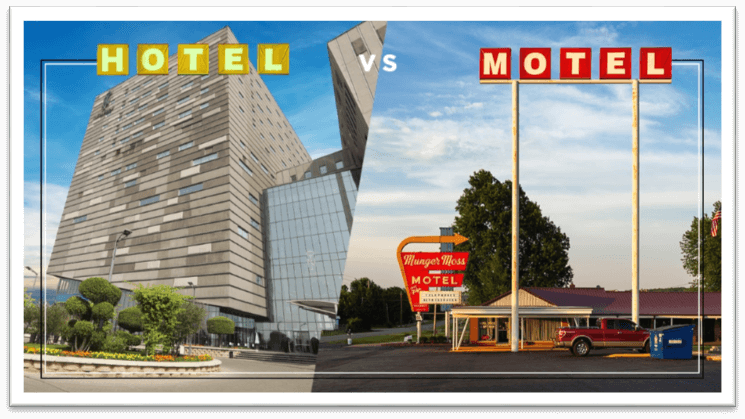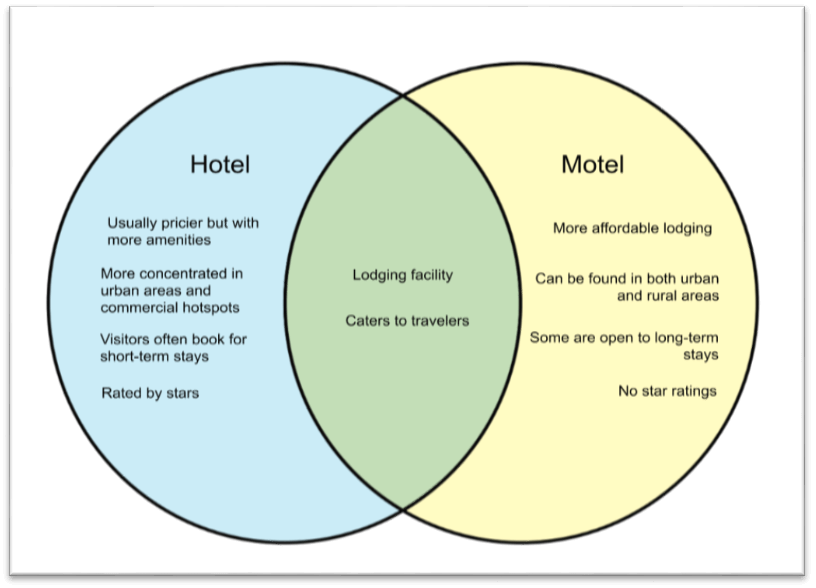Difference Between Hotel and Motel
What is a Hotel?
A hotel is a sort of lodging facility that gives visitors a place to stay. They frequently have a lot of amenities, including on-site dining options, fitness centers, and swimming pools. Hotels also often have a broader choice of room categories, such as suites and executive rooms, and a greater number of rooms overall. Additionally, they might have a 24-hour front desk and concierge services. Hotels are frequently found in populated regions, close to tourist attractions, or in commercial sectors. They offer better service and amenities than motels and are often more expensive.
What is a Motel?
A motel is a type of lodging establishment that offers rooms to guests who are frequently passing through or on the road. Compared to hotels, they are often more informal, less expensive, and smaller. Motels frequently only offer basic amenities like standard rooms and common areas. They frequently have convenient access to highways and have "drive-up" accessibility, which allows guests to enter their rooms directly from the parking lot. A restaurant or beverage vending machine may be available on-site at motels. They often have a front desk with limited hours of operation.
Hotel Vs Motel:
While both hotels and motels provide housing for travelers, there are some significant distinctions between the two.

- In general, hotels are more opulent and spacious than motels. They frequently have a lot of amenities like on-site restaurants, exercise centers, and swimming pools. Hotels also often have a broader choice of room categories, such as suites and executive rooms, and a greater number of rooms overall. Additionally, they might have a 24-hour front desk and concierge services. Hotels are frequently found in populated regions, close to tourist attractions, or in commercial sectors.
- On the other hand, motels are often more affordable and more compact than hotels. They cater to road users like truckers and road trippers and frequently offer a more relaxed ambiance. Motels frequently only offer standard rooms with few facilities and typically have smaller rooms. Additionally, they could have a restaurant on the premises or food and drink vending machines. The majority of motels are close to highways and are reachable by automobile.
- One significant distinction between hotels and motels is how the structures are organized. Hotels are often multi-story structures, and guests can access their rooms via stairs or elevators. Motels, on the other hand, are primarily one-story structures with rooms that are accessible from the parking lot. Drive-up accessibility is the term for this feature. This makes motels more convenient for driving travelers who need to park their cars close to their rooms.
- The degree of service offered also distinguishes hotels from motels. In general, hotels offer more amenities and a higher degree of service than motels. They frequently offer a concierge service to assist visitors with making dinner reservations, buying tickets, and other necessities. They might also include a front desk that is open around the clock for those who require assistance. On the other hand, motels might only have a front desk open for a certain number of hours.
- Hotels typically cost more than motels when it comes to pricing. This is because hotels offer larger rooms, have more facilities, and provide better service. However, the price of a hotel room might differ significantly based on the location, season, and type of accommodation, hotels are generally less expensive than hotels, but the cost can also vary depending on location and time of year.
The key difference between Hotels and Motels
The key differences between hotels and motels include the following.
- Size and luxury: Hotels frequently have larger, more opulent accommodations than motels, as well as a wider range of amenities and room kinds.
- Location: Hotels are frequently found in populated regions, close to tourist attractions, or in commercial sectors. On the other side, motels are frequently found along highways and are simple to reach by automobile.
- Layout: Hotels are often multi-story structures, and guests can access their rooms via stairs or elevators. Motels, on the other hand, are primarily one-story structures with rooms that are accessible from the parking lot.
- Service and amenities: Hotels frequently offer a higher caliber of service and more features than motels, like a 24-hour front desk and a concierge service.
- Due to their bigger size, more amenities, and higher standard of service, hotels are typically more expensive than motels.
- Target market: While motels are better suited for Roadtrippers, truckers, and other on-the-go travelers, hotels are better suited for leisure and business travelers.
The Conclusion
While both hotels and motels offer lodges for travelers, there are some significant distinctions between the two. Generally speaking, hotels are more expensive, more opulent, and larger than motels. They are frequently found in metropolitan locations, close to tourist destinations, or commercial sectors. Compared to hotels, motels are often more laid-back, less expensive, and smaller. They are frequently close to roads and are reachable by vehicle. Both hotels and motels have distinct qualities that appeal to various types of travelers.

|


 For Videos Join Our Youtube Channel: Join Now
For Videos Join Our Youtube Channel: Join Now









